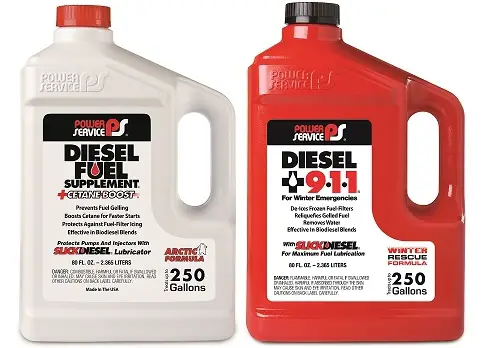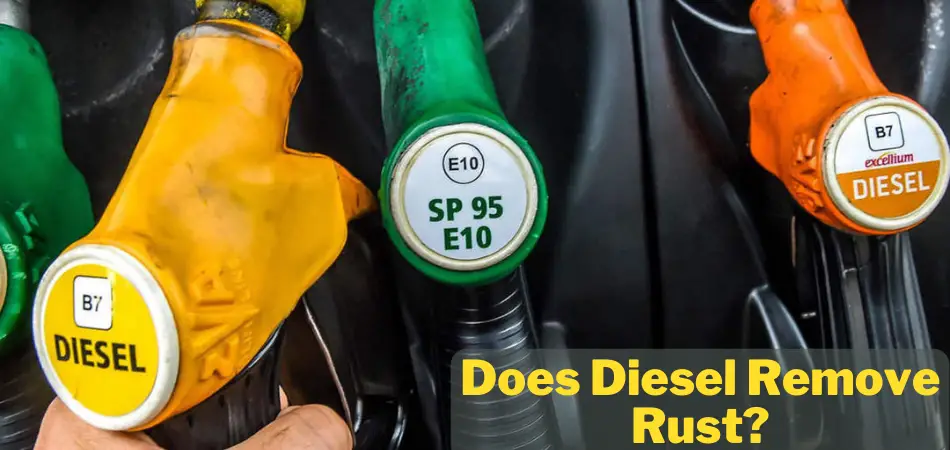Contrary to popular belief, diesel fuel will not remove rust. The myth probably arose because diesel fuel is a petrochemical and contains mild detergents that could help release some surface rust or residue from the metal. In addition, the oil in diesel can help protect metal surfaces against further corrosion, but does diesel remove rust?
Yes, diesel can remove rust, but it is not suitable for all types of techniques. However, you should know that the method is ineffective in preventing rust. In addition, this process does not guarantee that there will be no signs of rust on the surface of the metal after removal.
So, below you can read to learn further on the effect of rust on metals and ways you can remove and protect from future rust. Also, you will get to know in detail if diesel can work with removing rust on metals or not.
Contents
Effects of Rusting
- It could affect the magnetic properties of the metal
- It could cause brittleness to the metal endangering the safety of users
- It makes the metal weaker and sometimes difficult to use
- They create a powder-ish substance that could be a danger to the health of users
- They make the metal weaker
- Iron is a good conductor of electricity but with rusting, its productivity could be affected and it would decrease the metal’s effectiveness
How Long Does It Take for Iron to Rust?

When thinking about how long it would take for iron to rust, you could think about a year or maybe several. This is true but not entirely true; rusting begins when the metal starts having contact with the oxygen, although oxygen’s effect wouldn’t be visible until later (in a few years or so). Oxygen is a big factor in the oxidation process. It breaks down the metal’s molecules and makes the metal weaker as time goes by, causing the effect called rusting.
Water or liquid moisture on the other hand has a faster effect on causing rust, as earlier opined. It also causes breaks down of the metal molecules but faster. This is what happens when you use metal for kitchen use or as a utensil that would need to be washed multiple times; as time goes by, it would start trusting, and a rough orange flake-like powder would start appearing on these utensils.
What Is Diesel?
Diesel, in general, is any liquid fuel specifically designed for the use of diesel engines, in which fuel ignition takes place without any spark as a result of compression of the inlet air mixture and the injection of fuel. Therefore, diesel needs good compression ignition characteristics. (We will later see why this piece of information is relevant to our topic). It is also the common term for motor vehicles that use compression engines. Diesel was named after its inventor Rudolf Diesel, a German engineer, and it was invented in 1890.

Does Diesel Help with Rusting?
Although many have recommended the use of diesel across many social media handles and platforms, there is no evidence of solid proof that it works to prevent rusting, but should be able to remove rust (especially with the addition of an abrasive).
Some of the recommendations had described it to remove rust in ingenious ways; hence, classifying it as a life hack approach to removing rust from your metals. To do this, you must submerge the metal in a container with some diesel in it, and leave it submerged for up to 24 hours. By then, you should notice how the rust begins to fall off the surface of the metal. Afterward, you may remove the metal from the container, scrub the loose rust from the metal and then wash it thoroughly to clean the fuel off it.

Now, the use of diesel is a chemical rust removal method, which must be done cautiously. First off, because it’s gas, there’s the fear of blowing up from metal scratch, but diesel is less volatile. Interestingly, you can drop a lit cigarette into a vat of diesel and it will quench the cigarette. Because its ignition characteristic does not require spark, it’s less susceptible to blowing up indiscriminately.
Other safety precautions you must ensure when working with diesel are:
- It’s preferable to work in an open area with enough ventilation to avoid concentrated fumes
- Don’t mix products with Diesel except so directed by the manufacturer; this is to prevent possible unknown chemical reactions
- Ensure you store the fuel properly before and after use to prevent undue spillage, which can consequently result in chemical or fire accidents.
- Ensure your working area is far away from heat and power source or any flammable product
- Wear a face mask and eye protection to protect your face from a possible spill
Final Thoughts
Metal rust is sometimes inevitable, but there are many effective measures to slow down the process, remove, and as well prevent rust from metals. Using diesel should help with removing rust from the metal but you shouldn’t count on it to prevent future rust.
Removing rust with diesel is a pretty simple process, devoid of hassle. Nevertheless, because it’s categorized as a chemical rust removal process, you must be cautious with its usage although it’s an option that is considered to be relatively low in risk. Furthermore, adding an abrasive to diesel can be quite effective in removing rust.


